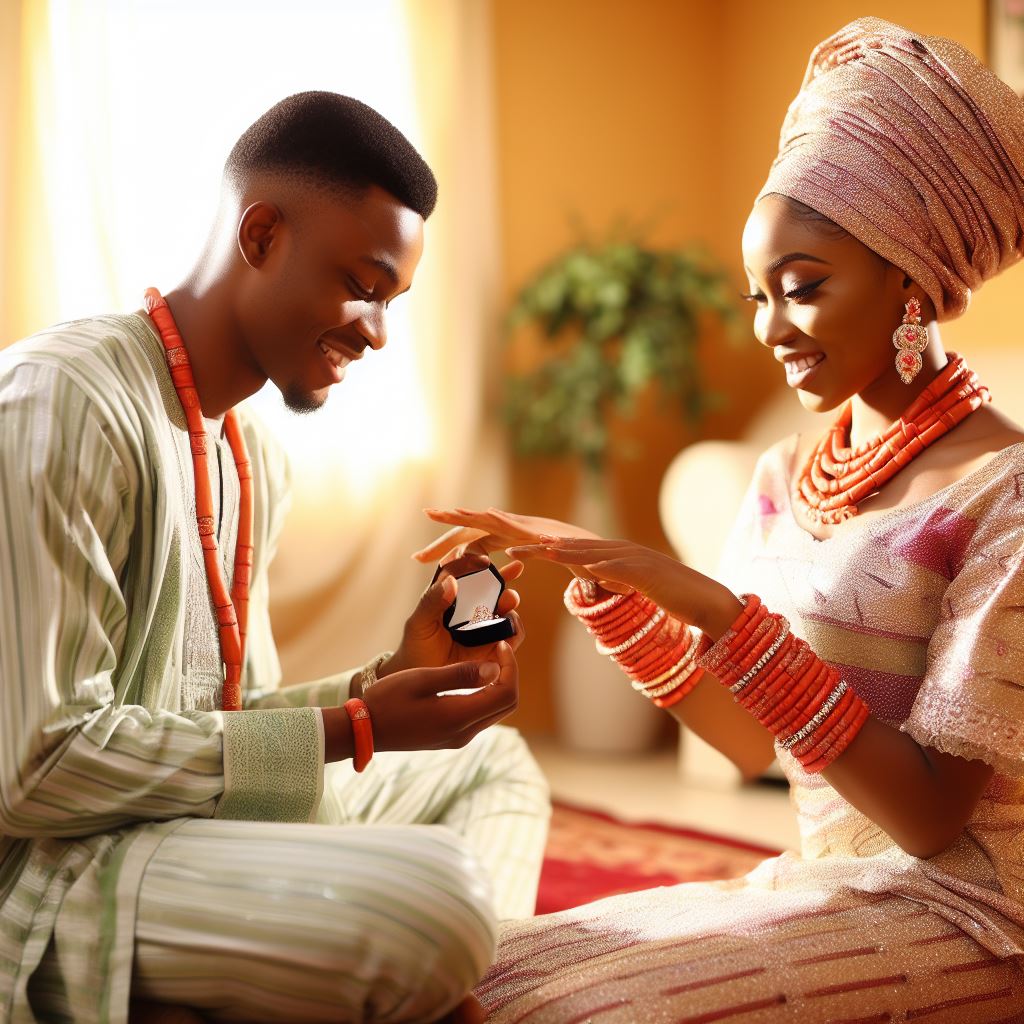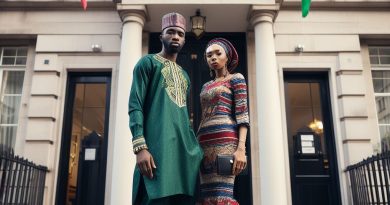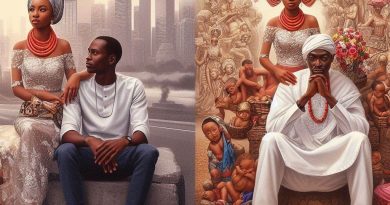A Guide to Traditional Nigerian Marriage Proposals
Last Updated on January 28, 2024
Introduction
Traditional Nigerian marriage proposals play a crucial role in the cultural fabric of Nigeria.
They involve the formal request for a bride’s hand in marriage, marking the beginning of the marriage journey.
These proposals are significant as they symbolize the union of two families and the continuation of cultural traditions.
A marriage proposal in Nigerian culture is not simply a private affair between two individuals; it is a communal event.
Family and community involvement are essential in ensuring the success and acceptance of the proposal.
The proposal serves as a platform for the families to meet, discuss, and agree on various aspects of the marriage.
The importance of marriage proposals in Nigerian culture goes beyond the union of two individuals.
It is an opportunity for families to showcase their wealth, honor their heritage, and maintain social connections within their community.
The proposal marks the beginning of the marriage negotiation process, where the groom’s family presents gifts and tokens to the bride’s family as a sign of respect and appreciation.
During the proposal, the groom’s family seeks the blessing and approval of the bride’s family.
It is a formal commitment made by the groom’s family to take care of the bride and uphold the cultural values and traditions of both families.
The proposal ceremony is a significant milestone in the journey towards marriage, strengthening the bonds between families and ensuring a successful union.
In essence, traditional Nigerian marriage proposals are an integral part of Nigerian culture.
They serve as a platform for families to come together, negotiate, and agree upon the union of their children.
The proposals showcase the cultural richness of Nigeria and reinforce the importance of family and community in marriage.
Preparing for a Traditional Nigerian Marriage Proposal
Understanding Nigerian cultural traditions and customs
Before embarking on a Nigerian marriage proposal, it is essential to familiarize oneself with the rich cultural traditions and customs of the country.
Nigeria is a diverse nation with over 250 different ethnic groups, each having its unique customs and practices when it comes to marriage.
Understanding these traditions will not only show respect but also help in planning a meaningful proposal.
Seeking permission from the bride’s family
In Nigerian culture, seeking permission from the bride’s family is a vital step in the marriage proposal process.
This tradition signifies respect and acknowledgment of the family’s role in the couple’s journey.
It is customary for the groom-to-be to approach the bride’s parents to request their blessing before proposing marriage.
Choosing the right time and setting for the proposal
When planning a traditional Nigerian marriage proposal, selecting the perfect time and setting is crucial.
Nigerians often prefer auspicious dates and locations that hold sentimental value.
The proposal can take place during significant family gatherings or celebrations, such as birthdays or holidays, ensuring the presence of loved ones and creating a warm and festive atmosphere.
Preparing the necessary items for the proposal ceremony
A Nigerian marriage proposal involves specific items and rituals that symbolize love, commitment, and acceptance.
One such item is the engagement ring, which represents the groom’s intention to marry the bride.
Additionally, the groom may present gifts such as kola nuts, palm wine, or traditional attires to the bride’s family as a sign of appreciation and respect.
The proposal ceremony further includes prayers, blessings, and exchange of vows in the presence of family and friends.
It is essential to consult with elders or cultural experts to ensure that all necessary items and rituals are prepared and carried out appropriately.
Basically, preparing for a traditional Nigerian marriage proposal requires a deep understanding of Nigerian cultural traditions and customs.
Seeking permission from the bride’s family, choosing the right time and setting, and preparing the necessary items are crucial elements to consider.
By honoring these traditions, couples can embark on a meaningful and memorable journey as they start their lives together.
Read: Stories of Success: Real-Life Impact of Marriage Duas
The Role of Family and Community
Involvement of both families in the proposal process
- Both families play a crucial role in the traditional Nigerian marriage proposal.
- The prospective groom’s family initiates the process by approaching the bride’s family.
- They seek the blessing of the bride’s family and ask for their consent for the marriage.
- The families come together to discuss the proposal, ensuring compatibility and mutual understanding.
- Often, the elders from both families are involved in these discussions, providing guidance and wisdom.
Importance of community support and approval
- Community support and approval are vital aspects of the traditional Nigerian marriage proposal.
- The couple seeks the blessings and approval of the community members.
- Community gatherings are organized where the proposal is announced and celebrated.
- Having community support ensures a strong foundation for the marriage and fosters a sense of belonging.
- The community’s involvement also helps to strengthen the bond between the two families.
Traditional rituals and ceremonies before the proposal
- Before the marriage proposal, several traditional rituals and ceremonies take place.
- The families perform these rituals to honor their ancestors and seek their blessings.
- These ceremonies also serve as a way to unite the families and prepare for the proposal.
- They may include prayers, offerings, and traditional dances and songs.
- These rituals help create a sacred and spiritual atmosphere leading up to the proposal.
Navigating traditional dowry negotiations
- One significant aspect of a traditional Nigerian marriage proposal is the dowry negotiations.
- The groom’s family presents gifts and items of significant value to the bride’s family.
- These gifts symbolize the groom’s ability to provide for his future wife and family.
- The negotiation process is an important tradition that involves mutual respect and compromise.
- Both families work together to determine a fair and meaningful dowry for the bride’s family.
Therefore, the role of family and community is paramount in traditional Nigerian marriage proposals.
Both families actively participate in the proposal process, seeking each other’s blessings and consent.
Community support and approval are also highly valued, ensuring a strong foundation for the marriage.
Traditional rituals and ceremonies pave the way for the proposal, creating a sacred and spiritual atmosphere.
Lastly, navigating the dowry negotiations requires mutual respect and compromise between the families.
Through these customs and traditions, Nigerian marriage proposals reflect the importance of family and community in the journey towards lifelong commitment.
Read: Gender-Specific Marriage Duas: What Men and Women Say
Elements of a Traditional Nigerian Marriage Proposal
Obtaining the bride’s consent
- The first step in a traditional Nigerian marriage proposal is obtaining the bride’s consent.
- The groom approaches the bride’s family to express his intentions of marrying her.
- The bride’s family discusses the proposal among themselves and with their daughter.
- If the bride gives her consent, the groom proceeds with the proposal process.
Traditional proposal gestures and symbols
- Traditional Nigerian marriage proposals often involve elaborate gestures and symbols.
- The groom may present a tray of kola nuts, which symbolizes hospitality and community.
- He may also bring palm wine, a traditional drink used to seal agreements and celebrate.
- Another common gesture is the groom’s family presenting the bride’s family with a set of clothes, jewelry, or money.
- These gestures demonstrate the groom’s respect, generosity, and commitment to the bride and her family.
Exchanging gifts between families
- In a traditional Nigerian marriage proposal, the exchange of gifts between the families is significant.
- The groom’s family brings various gifts as a token of respect and appreciation to the bride’s family.
- These gifts may include yam tubers, which symbolize fertility, and other traditional food items.
- The bride’s family reciprocates by presenting gifts to the groom’s family, often in the form of clothes, accessories, or money.
- This gift exchange symbolizes the bond and commitment between the two families.
Traditional engagement rituals and customs
- Traditional Nigerian marriage proposals involve a series of engagement rituals and customs.
- One common ritual is the introduction ceremony, where the families formally meet each other.
- Another important custom is the traditional engagement ceremony, known as the “Knocking on the door.”
- This ceremony involves the groom’s family visiting the bride’s family to officially ask for her hand in marriage.
- The couple may also go through traditional rites such as pouring of libation and reciting of prayers.
- These rituals and customs hold deep cultural and symbolic meaning, strengthening the bond between the families.
Most importantly, a traditional Nigerian marriage proposal encompasses several elements.
It begins with obtaining the bride’s consent and proceeds with various gestures and symbols to show respect and commitment.
The exchange of gifts between families further strengthens the bond, and traditional engagement rituals and customs solidify the relationship.
These elements reflect the rich cultural heritage and values of Nigeria, making a traditional marriage proposal a significant and cherished event.
Read: Balancing Individual Growth and Togetherness in Nigerian Marriages

Step-by-Step Guide to a Traditional Nigerian Proposal
Choosing the right location and time
- Select a meaningful and significant location that holds importance for the couple.
- Consider the preferences and traditions of both families when choosing the location.
- Ensure that the proposal takes place at a time when family members, friends, and community members can attend.
Gathering both families and community members
- Inform both families and community members about the upcoming proposal.
- Seek the blessings and approval of the elders from both sides of the families.
- Arrange for the families to meet and get to know each other before the proposal date.
Performing traditional rituals and ceremonies
- Engage in traditional marriage rituals such as the “knocking on the door” ceremony.
- Include traditional elements such as pouring of libations, prayers, and blessings.
- Involve cultural entertainments like music, dance, and storytelling to celebrate the union.
Presenting the proposal to the bride’s family
- Choose a spokesperson from the groom’s family to present the proposal to the bride’s family.
- The spokesperson addresses the gathered families, expressing the groom’s sincere intentions.
- The groom’s family presents gifts such as kola nuts, drinks, and traditional items as a symbol of respect.
Acceptance and celebrations
- The bride’s family discusses the proposal amongst themselves and decides on their response.
- If the proposal is accepted, both families exchange formal introductions and begin wedding preparations.
- Celebrations commence with feasts, music, dancing, and joyful expressions of happiness.
In fact, a traditional Nigerian marriage proposal involves carefully choosing the right location and time, gathering both families and community members, performing traditional rituals and ceremonies, presenting the proposal to the bride’s family, and finally, accepting and celebrating the union.
It is a beautiful and meaningful process that showcases the rich cultural heritage of Nigeria.
Read: Best Times and Conditions to Recite Your Marriage Duas
Challenges and Considerations
Tradition and modernity in proposals
One challenge faced in Nigerian marriage proposals is finding a balance between adhering to traditional customs and incorporating modern elements.
Couples must navigate the fine line between honoring tradition and their personal preferences.
Cultural differences and expectations
When entering into a Nigerian marriage proposal, individuals from different cultural backgrounds may face challenges in understanding and respecting each other’s customs and expectations.
Open communication and mutual respect are key in overcoming these hurdles.
Financial aspects and expectations
Finances play a significant role in Nigerian marriage proposals.
It is important for both parties to discuss and agree upon financial responsibilities, including bride price, wedding expenses, and future financial plans with openness and honesty.
Potential family objections or challenges
Family plays a crucial role in Nigerian marriage proposals, and it is not uncommon to encounter objections or challenges from family members.
It is essential for the couple to address and resolve these issues diplomatically and respectfully.
Find Out More: The Challenges of Polygamy: Balancing Love and Respect
Conclusion
Recap of traditional Nigerian marriage proposals
Encouragement to embrace and preserve Nigerian cultural heritage in proposals
Final thoughts and well-wishes for those planning a traditional Nigerian marriage proposal.
Generally, traditional Nigerian marriage proposals are deeply rooted in the rich cultural heritage of Nigeria.
They serve as a celebration of love and the union of two families.
The elaborate rituals, vibrant attires, and meaningful gestures make these proposals truly special.
It is important for Nigerians, both at home and abroad, to embrace and preserve their cultural heritage in marriage proposals.
By incorporating traditional elements, such as presenting palm wine or kola nuts, couples can honor their roots and pass down these beautiful customs to future generations.
For those planning a traditional Nigerian marriage proposal, remember to take the time and effort to research and understand the customs and traditions specific to your ethnic group.
Seek guidance from elders and ensure that you involve both families in the process.
May your traditional Nigerian marriage proposal be filled with joy, love, and blessings.
Embrace the beauty of your heritage and create memories that will be cherished for a lifetime.
Best wishes on this beautiful journey of love!


